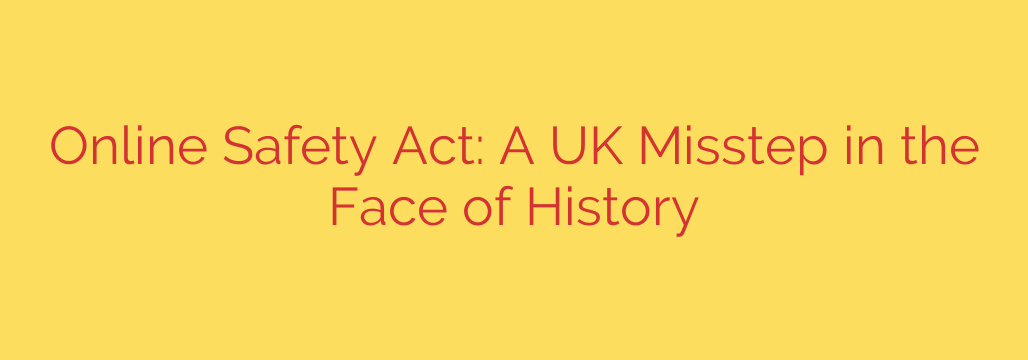
The UK’s Online Safety Act: A Dangerous Precedent for Digital Freedom and Privacy
The push for a safer internet is a goal few would argue against. In the UK, this ambition has culminated in the Online Safety Act, a sweeping piece of legislation designed to protect users, especially children, from harmful content. While its intentions are noble, the Act’s methods raise profound concerns about the future of digital privacy, free expression, and online security, not just in the UK, but across the globe.
History often provides a valuable lens through which to view the present. In this case, the Online Safety Act bears a striking resemblance to the 1857 Obscene Publications Act. Originally created to target pornography, the vague wording of the 1857 Act was quickly repurposed to suppress a wide range of materials, including political pamphlets and even scientific literature. This historical “scope creep” serves as a stark warning.
The lesson is clear: vaguely worded laws intended to curb specific harms often expand to suppress legitimate expression. The Online Safety Act, with its ambiguous definitions of “harmful content,” risks repeating this mistake on a digital scale, creating a new era of preemptive censorship.
The Assault on Encryption: A Backdoor to Your Private Conversations?
One of the most alarming aspects of the Online Safety Act is its potential to undermine end-to-end encryption. This technology is the bedrock of modern digital privacy, ensuring that messages sent on platforms like Signal and WhatsApp can only be read by the sender and the intended recipient. It protects everything from personal chats to sensitive business communications and confidential journalistic sources.
The Act, however, could compel these platforms to scan all messages—including private, encrypted ones—for illegal content. Technology experts are nearly unanimous on this point: you cannot create a “backdoor” for content scanning without fundamentally breaking the promise of encryption for everyone.
Mandating the scanning of encrypted messages fundamentally shatters their security model, exposing all users to new risks. A backdoor built for law enforcement is also a backdoor for malicious actors, from hackers to hostile foreign governments. This has led major tech companies like Signal and WhatsApp to state they would rather cease operations in the UK than compromise the security of their global user base.
The Inevitable Chilling Effect: When Caution Leads to Censorship
The legislation places a heavy burden of responsibility on online platforms, threatening them with staggering fines—up to 10% of their global turnover—for non-compliance. Faced with vague rules and catastrophic financial penalties, how will these platforms respond?
The most likely outcome is a significant “chilling effect” on free speech. To avoid risk, platforms will inevitably over-censor. Their automated systems and human moderators will be programmed to err on the side of caution, removing any content that could possibly be flagged as “harmful,” even if it is perfectly legal.
Platforms will become incentivized to remove legal but controversial content, stifling open debate and creating a sanitized, risk-averse public square. This means that nuanced discussions on sensitive political, social, or scientific topics could be automatically flagged and suppressed, not because they are illegal, but because they are algorithmically inconvenient for the platform.
Practical Steps to Protect Your Digital Privacy
While the Online Safety Act is UK law, its implications are global, setting a precedent that other nations may follow. As the lines between public safety and digital surveillance blur, taking proactive steps to protect your privacy is more important than ever.
Here are some actionable security tips:
- Prioritize End-to-End Encrypted Services: Whenever possible, use messaging apps and email providers that offer strong, verified end-to-end encryption. This remains the gold standard for protecting the content of your communications.
- Use a Virtual Private Network (VPN): A reputable VPN encrypts your internet traffic and masks your IP address. This prevents your internet service provider (ISP) from seeing your online activity and makes it harder for third parties to track you.
- Review Your Privacy Settings: Regularly audit the privacy settings on your social media accounts and other online services. Limit the amount of personal information you share publicly.
- Stay Informed: Keep up to date with digital rights issues and legislation in your country. Supporting organizations that advocate for digital freedom and privacy can help defend these essential rights.
Finding the Right Balance
The desire to protect citizens from genuine online threats is understandable. However, the approach taken by the Online Safety Act is a dangerous misstep. By ignoring the lessons of history, threatening the very fabric of digital security, and fostering an environment of censorship, it risks causing far more harm than it prevents.
True online safety cannot be achieved by sacrificing the fundamental rights of privacy and free expression. A better path forward requires more nuanced, technologically sound solutions that target bad actors without dismantling the digital security and freedoms upon which we all depend.
Source: https://go.theregister.com/feed/www.theregister.com/2025/08/08/opinion_column_osa/








